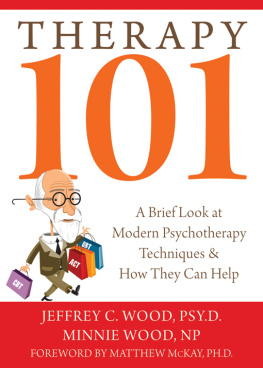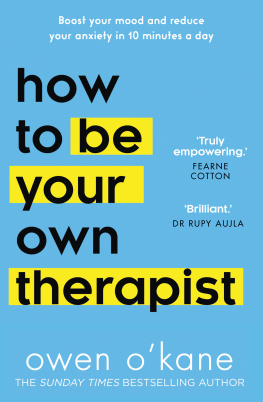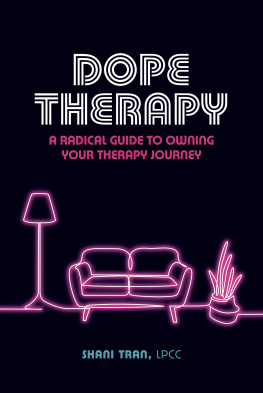SOMETIMES
THERAPY IS
AWKWARD
A Collection of Life-Changing Insights for
the Modern Clinician
NICOLE ARZT
Copyright 2020 NICOLE ARZT
All rights reserved. No part of this publication may be reproduced, distributed, or transmitted in any form or by any means, including photocopying, recording, or other electronic or mechanical methods, without the prior written permission of the publisher, except in the case of brief quotations embodied in critical reviews and certain other noncommercial uses permitted
by copyright law.
Book Design by HMDpublishing
Contents
Introduction
Before I was a therapist or writer, I was a reader.
Growing up, I read everythingthe backs of cereal boxes, shampoo labels, my moms trashy romance books. I devoured newspaper articles and instruction manuals, and I lived for trips to the bookstore and local library.
As therapists, we know that reading is an integral part of our profession. I think most of us enjoy reading, and even those who dont like to pretend they do. After all, what therapists office doesnt have rows of books on the shelf arranged just so? Did you purchase my bright-yellow paperback and imagine how and where you would position it in your office?
I have read so many books about this profession. A handful profoundly defined my identity as a therapist, but many of them felt dry, academic, and utterly disconnected from reality. If anything, reading those books often left me feeling even more insecure about my craft.
Therapists have good intentions when they write books. But their message often becomes dilutedit becomes less about the nuances of personal development as a therapist and more about showcasing a series of their successes. When therapists write books, they often describe nothing less than pure clinical wizardry. They share how a single intervention reversed years of complex trauma. They talk about how a simple cognitive reframe cured the contentious resentment between a couple headed toward divorce.
As a new therapist, I experienced their all-knowing insight as ingenious and their techniques nothing short of magical. But their effortless expertise also left me worried. Would I transform into a flawless therapist like them? Could I replicate their brilliance?
While they dreamt entirely new theories in their sleep, I was busy being awkward and overly sarcastic. I said dude and fuck in my sessions. I spent a great deal of time frantically looking up interesting group activities online. Furthermore, my therapy never seemed life-altering. I doubted myself and my abilities constantly.
And while those authors meditated between clients, I drank copious amounts of coffee and ruminated about my flopped interventions. I didnt have cures for my clients. I did, however, have constant thoughts along the lines of believing my neighbors hamster would be a better therapist than me.
Was I a complete imposter? Was I just a naive child playing dress-up with my diplomas and discount Banana Republic outfits? Or could I effectively diagnose and treat mental illness like those expert therapists? I wasnt so sure. Sometimes, Im still not sure.
I am a licensed marriage and family therapist. Ive worked in various settings, including schools, hospitals, nonprofit centers, residential facilities, and private practice. But this is just one part of my identity. Im also a woman, wife, mother, and avid believer in desserts and long hikes. In addition to my therapy career, I am a professional writer, and I own a content marketing agency specializing in helping therapists build their online presence. Finally, I am the founder of Psychotherapy Memes, a global community that acknowledges both the joys and struggles of being a therapist.
I didnt have a business plan or motive when I started Psychotherapy Memes in 2018. I just wanted to make and share memes. As it turned out, many people enjoyed those memes! More than anything, my community inspired me to write this book. At the time of this writing, we have over 65,000 Instagram followers, most of whom identify as mental health professionals.
The surprise success catapulted me into this strange role of a virtual social media influencer. I take this role seriouslyI know that large platforms have the capacity to influence dynamic change and critical thought. Through my social media experience, I have gathered some basic assumptions about therapists:
- We often graduate from school feeling woefully unprepared.
- We re scared we wont make any money.
- We (mostly) love the work we do.
- We doubt ourselves constantly.
- We second-guess our career choice.
- We often feel unappreciated in the healthcare system.
- We re tired of subpar working conditions.
- We feel alone in our insecurities.
- We wonder if were helping our clients.
- We have a dark sense of humor.
I want to note that I struggled immensely in writing this book. I dont have overly impressive credentials. Im not an expert in theory, and I havent published any world-famous research. While writing, I often lamented to my husband about my perceived incompetence. I doubted that I had anything real to offer prospective and current therapists. He encouraged me to keep writing. Everyone who knew I was writing this book encouraged me to keep writing. So, I kept writing.
I believe in the work we therapists do. We deserve to feel supported and empowered in this field. But we differ from our predecessors, and we need more books to reflect those differences. For instance, maybe we arent as formal and poised as some seasoned therapists, but we are still empathic and dynamic. Maybe we feel torn between holding professional titles and being authentic humans. And maybe were done with those clickbait articles telling us seven ways to improve our self-care.
I am not a psychotherapy expert. I continue to make many mistakes. I question my own mental health. At times, I struggle with immense shame and fear and self-doubt. But I wrote the book I wish I could have read when I was starting this career.
This book is for aspiring therapists, new therapists, and any therapist who identifies with feeling ashamed, afraid, and uncomfortable in their profession.
I see you. I am you. And I believe we need space for the messy and flawed and hopelessly insecure parts that can go along with doing this work.
Acknowledgments
First, I want to acknowledge and thank all the many clients I have worked with over the years. Therapy is chilling soul work, and you continue to shape, challenge, and inspire me. You are so brave; please know I feel truly honored to have been a part of your life.
I want to acknowledge all the professors, mentors, supervisors, and colleagues Ive had over the years. Some of you were supremely helpful in teaching me about what it meant to be a therapist. Some of you showed me exactly what not to do. Your feedback has stayed with me throughout my career.
Behind every successful therapist is another successful therapist who believes in them. I want to thank the therapists who have supported me in my personal growth. I am a better person because of the reflective work I continue to embrace.
I want to thank Kate Western, Maritza Mata, Michelle Liva, Lauren Landwerlin, Luis Figueroa, Nicole Dilella, Rebecca Hillman, Sonia Milbank, and Stephanie Grogan for reading and tearing apart my initial drafts and helping shape this book.
To all my Psychotherapy Memes fans and followers, you are so loyal and passionate about psychotherapy. You give me so much excitement for where our field is headed, and I love this community we have created. Thank you for believing in me.
To my family, thank you for always eagerly encouraging me to write. I suppose I really am a legitimate author now!
To my kindred spirit, thank you for being an unconditionally loving best friend. You know who you are, and you are amazing.
Next page









